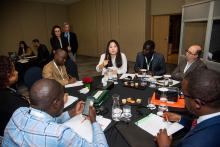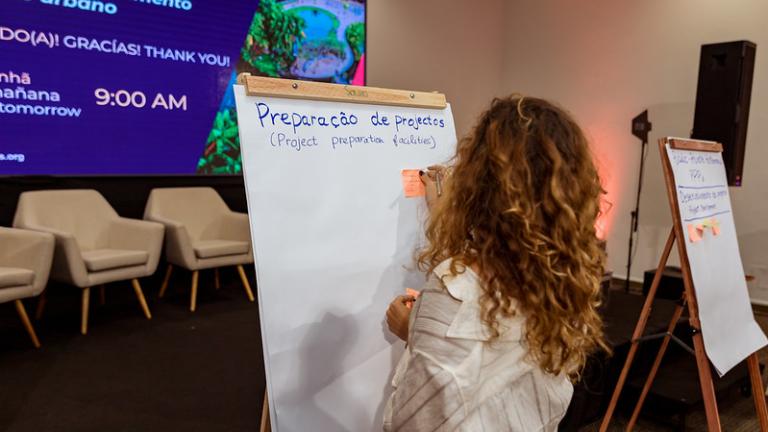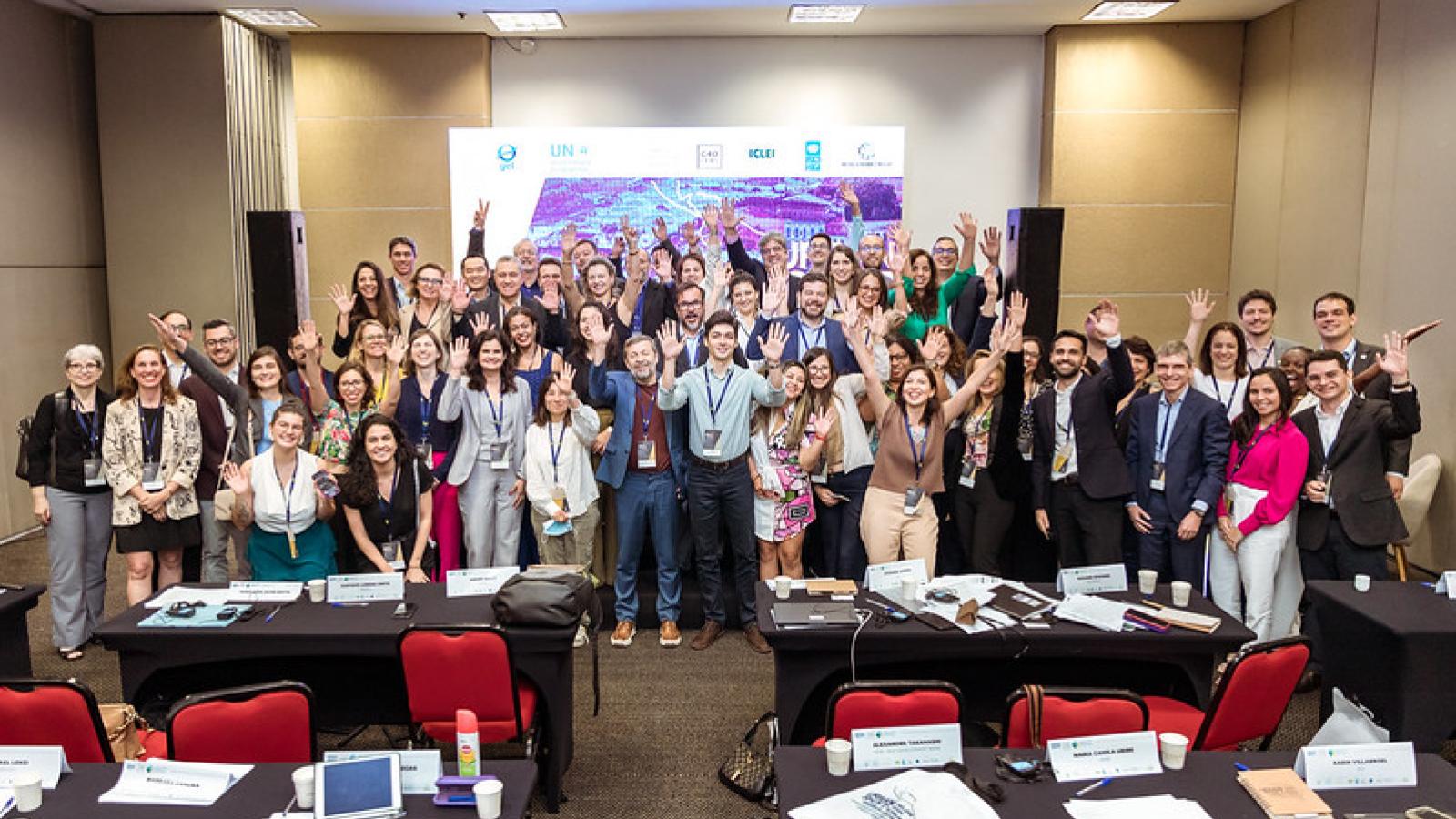Opinion
UrbanShift Looks Back: On the Value of Expanding Access to Urban Climate Finance
C40's Jessy Appavoo, ICLEI's André Almeida da Vila, and UNEP's Sharon Gil share why and how UrbanShift has prioritized support for cities to access climate finance.
The UrbanShift project will conclude in October 2025. In the program’s final year, we will be looking back at our work to support integrated and sustainable urban planning through a series of conversations with the partner organizations who have led UrbanShift. This is the second piece in this series. Read the first, on our capacity-building work, here.
Jessy Appavoo: From the beginning, UrbanShift has had a strong focus on finance because lack of access to finance is one of the major roadblocks cities face in implementing climate action and sustainable urban development at the scale and at the pace needed. So addressing that gap is one of the driving forces of our work: There would be limited impact without finance.
André Almeida da Vila: At the time that the UrbanShift program was designed in 2019, we were seeing a lot of cities stepping up their ambitions in terms of sustainable development and climate action in the wake of the Paris Agreement. But this made more evident the gap that existed between the types of infrastructure and actions envisioned in these plans, and the ability of cities to access the finance to implement them. That’s why UrbanShift has such a broad offer related to urban climate finance: We realized that we needed to address not only the upstream issues related to climate action planning, but also project development and the lack of direct connections to financiers.
Eillie Anzilotti: The breadth and range of UrbanShift’s finance offer really is striking, From your perspective, how do the different capacity-building elements we offer support cities?
André Almeida da Vila: Finance is vitally important for everything that happens in cities, but we recognize that it's also a very complex landscape to navigate. Our City Academy course on Accessing Urban Climate Finance—which we at ICLEI created both as an online module and as an in-person training delivered in all three of our regions—was designed as a comprehensive overview of finance sources and instruments; project conceptualization and development; and ensuring project bankability. We've seen that there's a huge appetite for this knowledge: over 900 people have completed the online course, and our in-person trainings have reached over 130 participants from 59 cities.
Jessy Appavoo: Our Finance Academies, nine of which have been rolled out by the C40 team during the lifespan of the current phase of UrbanShift, dovetail really well off the City Academy training. Finance Academies are in-depth, sector-specific trainings—on adaptation, for instance, or electric mobility—that explore a variety of financial instruments and how to navigate the policy landscape in a specific region. We’ve seen that there's so much to be learned from what a city has done that has worked, so other cities can adapt the tools/models in their own context. For instance, during a Clean Energy Finance Academy we hosted in Cape Town in December 2022, a city from Latin America presented their tried and tested tiered approach on tax incentives for rolling out household rooftop solar energy. Representatives from Freetown, Sierra Leone were in the room and are now exploring how to use a similar tiered approach to increase both revenue collection in the city through clean energy incentives . The reverse is also true: If a city shares something that hasn’t worked, it will save others the pain of going down the same pathway.
Our Investor Roundtables—led by C40—are designed to bridge the gap that André was talking about between cities and financiers. For these Roundtables, we create an opportunity for cities to present their projects directly to financiers and receive feedback in real time. We work with cities upstream to identify projects that would be of interest to the financiers, discuss the impacts, and shape the opportunity with them. It's bringing demand and supply under the same roof—and what better way to start shifting the flow of finance than to facilitate direct dialogues between those who provide finance and those with a need for it?

André Almeida da Vila: The other layer of this is the direct support we offer to projects. ICLEI’s Transformative Actions Program (TAP) is in its 10th year of helping cities strengthen their projects to attract investment; we’ve aligned TAP with the UrbanShift finance offer and have seen 27 cities from the UrbanShift network submit their projects to TAP. We’ve been working with them to refine their concepts and offer feedback to make their projects more impactful and cross-cutting. So far, we’ve connected eight projects to financing opportunities. Buenos Aires, for instance, was able to secure support from the Gap Fund for a comprehensive urban mobility plan, based on a concept they originally submitted to TAP.
Jessy Appavoo: C40’s Light-Touch Technical Assistance offer helps cities turn the inspiration they gather at our capacity-building events into more concrete plans. For instance, we were able to offer dedicated support to Freetown so they could explore how they could design a solar energy rollout plan. It’s essentially a flexible pot of money that we can apply toward supporting cities to answer these in-depth finance-related questions that could be the difference between a project lingering in the idea phase or becoming a reality.
Eillie Anzilotti: How have you seen the conversation around the need for greater access to urban climate finance evolve over the course of UrbanShift?
Sharon Gil: There is a lot more recognition now around the need to engage local governments in the environmental movement more broadly, and finance has been a key point in the conversation. Through UrbanShift, UNEP has led our advocacy effort to raise awareness of the critical role cities play in biodiversity, waste mitigation, and so many more aspects of climate action. For those of us who have been working in this space for a while, the problem of lack of access to finance has always been top of mind. But over the past five years, we’ve seen the entire world start to wake up to the idea that cities need to be resourced to live up to their transformative potential. UrbanShift has made a concerted effort to contribute to this conversation through our efforts to establish a presence at key events. For example, we hosted a discussion on the role of cities in combatting plastic pollution in Paris in 2023, before the negotiations around a global plastics treaty began. Before our event, local governments were completely absent from the negotiations, but now they are brought in. We were really able to underscore the role of local governments in developing and implementing policy, and you cannot separate policy from finance.

André Almeida da Vila: This speaks to some of the barriers we’ve encountered in encouraging this broader access to urban climate finance. In many countries, cities face significant constitutional or legislative barriers to accessing external finance or even in developing their own projects—it can be quite hierarchical. It takes a lot of resources and time to overcome these structures, and often cities aren’t able to follow through with their own ideas.
Sharon Gil: But we are starting to see some transformation in this sense as well, and a growing awareness of the need for cities to have a greater voice on the global stage and to advocate for themselves as entities. The Coalition for High Ambition Multi-Level Partnerships (CHAMP), which launched during COP in 2023, is intended to provide this platform for cities and elevate their voices and their needs.
Eillie Anzilotti: UrbanShift’s finance offer has reached so many cities and as we’ve talked about, contributed to evolving conversation around the need for greater access to finance. What do you think the next steps are in continuing to push for expanded urban climate finance?
André Almeida da Vila: I see a huge need to invest more in supporting urban financial governance. We’ve focused a lot on equipping cities with knowledge of financial instruments and institutions, but there’s so much to explore and strengthen around how cities can improve their revenue collection and their creditworthiness to open up even more opportunities.
Jessy Appavoo: As we’ve seen this conversation around urban climate finance evolve, we’re also starting to see financial institutions and development banks express more openness to creating specific financial instruments that cities could directly access. I would love to see UrbanShift continuing that conversation directly with those financial institutions.

Eillie Anzilotti: If you were to name one standout moment from your time with UrbanShift supporting cities on finance, what comes to mind?
Jessy Appavoo: For me, it was seeing the lightbulb go off during our 2023 Finance Academy on adaptation in Brazil. A representative from a major Brazilian city shared the immense challenges they face around flood and drought management—and presented a bold project idea to address them at scale. In the room were several financial institutions. That moment sparked real interest, and conversations continued beyond the Academy. As a result, the city significantly increased its chances of securing over $700 million to boost its long-term climate resilience. It was a powerful reminder of what can happen when cities have the space, tools, and audience to turn ambition into action.
André Almeida da Vila: Our City Academies on Urban Climate Finance built toward a session where the participants would develop and present a pitch about their project to a panel of experts as a training exercise. At first, city officials were somewhat shy and reluctant to present their ideas. But after the first city went, there was this flood of enthusiasm, and more and more cities got up to pitch. Seeing them develop this sense of ownership and pride in their projects at the end of the training made me feel that we had supported them in developing the tools and skills to confidently pitch these projects to investors and bring them to their cities.
André Almeida da Vila is an Officer in the Innovative Finance Team at the ICLEI World Secretariat.
Jessy Appavoo is the head of UrbanShift for C40 Cities and the Regional Coordinator for Africa.
Sharon Gil is the Cities Lead at UN Environment Programme.

UNEA-7 Cities and Regions Summit
Hosted in the lead-up to UNEA-7, this Summit will unite subnational leaders to strengthen collaboration and amplify the importance of cities.

Sustainable Finance Action and Advocacy: A Roadmap for Global South Cities
This C40-led webinar, held alongside 4th International Conference on Financing for Development (FfD4), aimed to equip mayors with the tools they need to advocate for expanded and accelerated access to urban climate finance.

Unlocking Subnational Finance for Green Sectorial Transformation: A Focus on Buildings & Cooling
Hosted during COP30 in Belém, Brazil, these dynamic panel discussions will explore strategies for enhancing access to transformative finance, and how these resources can support local climate transitions.

UrbanShift Looks Back: On Changing the Conversation around the Role of Cities in Climate Action
Over the past five years, UrbanShift's advocacy efforts have helped to shape the conversation around the value of cities for driving transformative progress. UNEP's Gulnara Roll, Sharon Gil and Elsa Lefèvre share their reflections.

